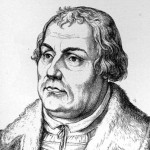he discovered he was at war with the world. The irony—that the sweet and pure good news from heaven would bring such enormous warfare and destruction—was not missed by Luther. In his later years, he would reflect on how the world has ever been at war with the gospel, going back even to Paradise and the murder of Abel by Cain. He perceived this rage against the promise of grace continuing on through history, up to his own time. ‘Yet I am compelled to forget my shame and be quite shameless in view of the horrible profanation and abomination which have always raged in the Church of God, and still rage to-day, against this one solid rock which we call the doctrine of justification.’”1 (Page 35)
“Luther [recognized] that the law and gospel are two entirely distinct categories: law is not gospel, gospel is not law. The beauty and power of each vanish when they are blended together. The perfection and majesty of the law is compromised, and the announcement of the good news that Christ kept the law for us and suffered the curse of the law for us is entirely lost. Blending the two leads one into suffocating moralism, anguished guilt, or a lofty legalism that destroys everything and everyone in its wake.” (Page 47)
“Luther grasped the fact that sinners were declared righteous by God apart from any of their works, whereas the [Roman] Church in Luther’s day taught that sinners were made righteous in actual conduct as they cooperated with God’s grace. This actual righteousness, the Church taught, was the means by which a person was justified before God. Luther understood the subtle yet damning error in this teaching, for while it acknowledged God’s grace as helping the sinner to obey, it placed salvation back into the efforts of man and removed the objective peace of God that rested entirely in Christ alone.” (Page 51)
Three Problems with Free Will
“Salvation by works. Luther understood free will as being at the very heart of the gospel. He realized that if man’s will is truly free, then man is capable of keeping God’s law perfectly and thus earning a right standing with God. Continue reading

